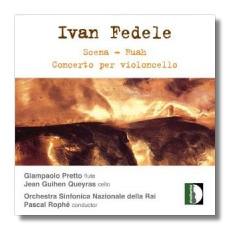
The Internet's Premier Classical Music Source
Related Links
- Latest Reviews
- More Reviews
-
By Composer
-
Collections
DVD & Blu-ray
Books
Concert Reviews
Articles/Interviews
Software
Audio
Search Amazon
Recommended Links
Site News
 CD Review
CD Review
Ivan Fedele

- Scena (1997/98)
- Ruah (2001/02)
- Cello Concerto (1996)
Giampaela Pretta, flute
Jean Guihen Queyras, cello
Orchestra Sinfonica Nazionale della Rai/Pascal Rophé
Stradivarius STR33650
The geographical lottery, combined with selective adoption of 'foreign' composers for marketing and promotion, determines which contemporary composers are known and heard in different countries. Ivan Fedele (b. 1953), now in his prime at 50, may be an obscure or even unknown name to you? This CD of major orchestral works provides as good an opportunity to begin to catch up.
Scena was written for the Scala Milan, and premièred there by Riccardo Muti. It is a theatrically inspired piece with musical figures conceived as 'characters', theatre 'in the world of memory', with references to Italian theatre and La Scala in particular.
Ruah is a concerto for flute, 'the airiest instrument there is – beyond pure sound breath turns into noise – free from the influence of traditional modes of expression'. The orchestra provides 'a resonating environment' for the melodies and arabesques of the flute. It is a concerto for the new century, one not likely to be quickly surpassed, and played here with beautiful tone throughout by Giampaolo Pretto.
The cello concerto is a major work in four movements played continuously. Fedele talks about the concept of 'resonance' – the orchestra 'a large resonating space – an environment reacting to stimuli provided by the soloist'. He contrived that when the whole orchestra plays, it does so with 'extreme separation between the registers' so that the cello would occupy the central space without being covered up; at other times the soloist would 'stay afloat in the treble over the bass (or vice versa) – in a game of alternation and diversification of harmonic fields between soloist and orchestra'.
The composer having thus so skilfully and scrupulously confronted 'the notoriously problematic relationship between solo cello and orchestra' I regretted that the technical team felt it necessary to bring the cello a little too forward for my taste; I look forward to hearing it live, in the expectation that balance problems will prove to be solved as successfully as did Dvořák all those years ago!
An absorbing programme, which I have played through twice and will return to again. Fedele's music is both complex and accessible, to be studied at various levels and enjoyed by ordinary listeners.
Copyright © 2003, Peter Grahame Woolf

















